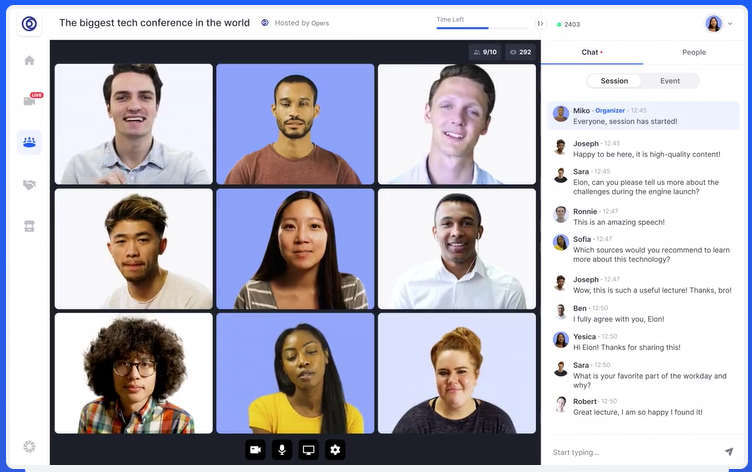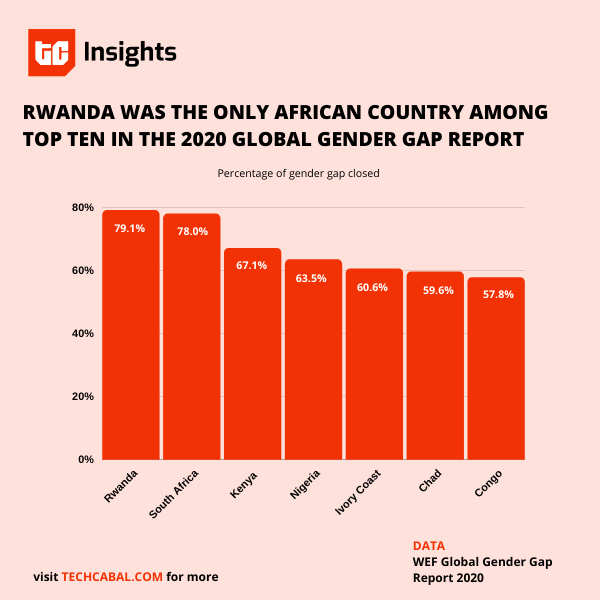
IN PARTNERSHIP WITH

Good morning ☀️ ️
Wanna see something funny? Netflix has created a Tiktok clone called Fast Laughs. It lets people scroll through funny clips without having to watch a whole TV show or movie.
Reason: People are spending more time on TikTok and therefore less time on Netflix.
Editor’s Note: There were a few errors in the profiles posted in yesterday’s newsletter. A corrected version is up on the website now and can be viewed here.
In today’s edition:
- Hopin’s rise
- Lagos Ride
- Google’s pledge for Women
- First Zimbabwean startup backed by Techstars
- TC Insights
Hopin triples valuation within a year

Virtual events platform Hopin has had quite a year! It recently raised a $400m Series C round, its third round in a year, raising its valuation to $5.6 billion.
Funding journey:In the last year, Hopin has raised a total of $565 million in venture capital funding, including a $40 million round in June and $125 million in November, the latter on a valuation of $2 billion
What’s different about Hopin: Unlike most other videoconferencing services, it’s designed from the ground up to provide support for conferences, including the management of stages, networking, breakout sessions, sponsors, tickets and analytics.
How’s Hopin doin?
Since November, it has added 30,000 customers including American Express, The Financial Times and Hewlett Packard, bringing the total number of organisations it has worked with to more than 85,000. It has also grown over the last 12 months from zero revenue to $70 million in annual recurring revenue.
The fully remote company now has more than 400 employees (up from 23 in April 2020) and is announcing several new senior hires. It has also acquired two other businesses — mobile app development company Topi (for an undisclosed amount) and video streaming company StreamYard (for $250m) — and says it will continue seeking opportunities to grow.
Looking forward: With Covid-19 still present, Hopin can expect more virtual events to happen, a perfect condition for its business to thrive.
Want to get smarter about fintech in Africa? Listen to the Decode Fintech Podcast by Paystack!
How do you leverage customer interactions to grow your business? In this episode, Paystack’s Customer Success Manager shares the key metrics he tracks, the tools his team uses, how to turn unhappy customers into brand advocates, and how Paystack uses customer service data to improve the product.
▶️ Listen to Episode 3: How Paystack Drives Growth with Customer Service
Another ride hailing company by the Lagos State Government

Last week, the Lagos State Government announced the launch of Lagos Ride, a ride-hailing service in Lagos, Nigeria. It has also set up a joint venture agreement with CIG Motor Co. Limited to set a vehicle assembly plant.
According to a statement by the Lagos state governor, Babajide Sanwo-Olu, Lagos Ride will deploy 1,000 units of brand new Sport Utility Vehicles (SUVs) within the Lagos metropolis. The new scheme is targeted at improving mobility and creating a multi-modal transportation system for Lagosians.
Sounds familiar?
You’re right. In March 2020, Ekocab, a ride-hailing service that looked to rival Uber and Bolt, was launched in partnership with the Lagos state government.
In December 2020, another ride-hailing company, UNIVASA, launched to partner with yellow taxis, raising even more questions about the fate of Ekocab.
Question: Will more cars and SUVs improve transportation in Lagos?
Read more: Lagos launches another ride-hailing service, signs vehicle assembly partnership
Google pledges $25 million for Women and Girls

Yesterday, Google announced it will award $25 million in cash grants to non-profits and social organisations in its Google new Impact Challenge (GIC) for Women and Girls.
Applicants will need to show how their project can create prosperity for women and girls by empowering them. Those who qualify for funding will receive between $300 000 and $2 million.
Next step: Interested persons should apply by April 19th
Meet the First Zimbabwean startup backed by Techstars

In January, Techstars Seattle announced its 12th class, featuring 10 startups from different parts of the world. For the first time the accelerator, which has accepted only a handful of African startups, included one from Zimbabwe in this class.
Meet AfiBlocks
AfriBlocks is addressing the high unemployment rate that plagues many African countries by making it easier for people to find work.
Despite the fact that its competing with a number of international and local freelance websites, still, according to CEO Tongayi Choto, most of them offer too many options with no adequate vetting process.
How it works: When a job is posted on its platform, the company claims that they save the customer the trouble of perusing thousands of freelancers profiles and portfolios. Instead, they use automation tools to match three freelancers who fit the user’s qualifications.
Also, AfriBlocks assigns to the selected freelancer a project manager who manages the project through completion. Once the job is complete, AfriBlocks collects a transaction fee, and the payment is released from escrow.
Big Picture: It is predicted that freelancers will account for as much as 80% of the entire workforce worldwide by 2030. For AfriBlocks, the long-term goal is to build the tech infrastructure for the future of work in Africa.
Read more: This pan-African freelance platform is the first Zimbabwean startup backed by Techstars
TC Insights: Focusing on women
In 2006, the World Economic Forum launched a global index to determine the gender gap across the world, using indices such as economic participation and opportunity, political empowerment, among others. Sub-Saharan Africa ranked 7 out of 8 regions in 2006. Fourteen years later, it ranked number 6.
From a 38% gap in 2006 to 32% in 2020, not much has changed. In fact, the region’s 2020 ranking is helped by high performers like Rwanda which ranks among the top 10 countries.
It is worth noting that Rwanda slipped three places compared to the previous year, but this shows that affording men and women the same opportunities is a work in progress, but it is work that must be done.
Still, Rwanda has a pioneer position, and this can be attributed to the efforts of its government to involve more women in ICT and STEM fields. Additionally, the government strongly supports initiatives that encourage school-age girls to develop innovative tech or business ideas.

So instead of creating new initiatives, African governments should strengthen existing ones. Even though there have been more programs targeted at women in tech, participation levels are still low. 61% of African women are members of the labour force; only 30% of these women are in tech.
What’s stopping these women from having tech careers? According to the Nigerian Women in Tech report powered by the UK-Nigeria Tech Hub two things – interest and access. They are either not interested in tech because of stereotypes that say tech is for men or that assign certain courses to women in their secondary and tertiary education.
It could also be that women who are interested in tech don’t have access, perhaps due to the limited number of female mentors and networks particularly for women in remote areas. 22.4% of the girls surveyed by W.TEC stated that they would be more encouraged to pursue STEM careers if they knew more women in STEM.
Apart from these, it could also be poor internet connectivity which reduces the number of opportunities that women think are available to them.
But driving interest and enabling access are not mutually exclusive, and there is a need to constantly prioritize both.
Get the Nigerian Women in Tech Report here. Also, get TechCabal’s reports here and send your custom research requests to tcinsights@bigcabal.com.






















